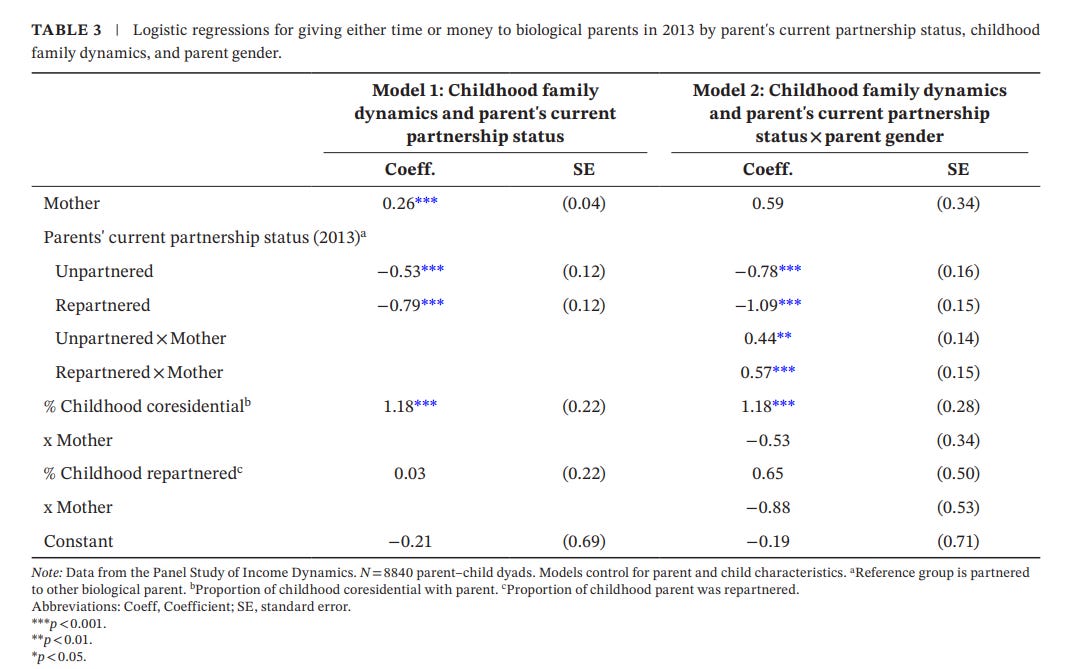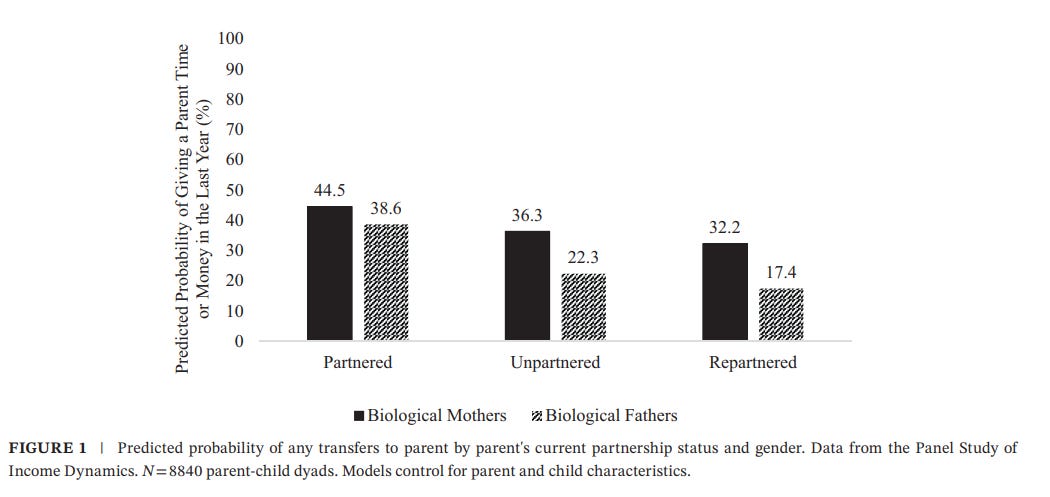What Weakens the Ties That Bind, and Other Interesting New Research
CPS Investigations Are Good, Actually; Eldercare Isn’t Stopping Europeans from Working; More Evidence That Partnership is a Privilege; The Class Gap in Screentime (Part 2) + more
A note for newcomers: Welcome! This is a weekly round-up of newly published research on demography, family policy, and other family stuff. Some of the studies included here may be pre-prints or working papers and have not yet been peer reviewed. And while I have done my best to summarize their findings accurately, in the words of Ebenezer Scrooge, “I am a mortal, and liable to fall.” So we operate on a “pinch of salt” policy around here.
Hello everyone,
I am running late to get my children from school so I will keep it brief up here. Above the paywall, we have a study looking at how family structure influences a child’s likelihood of helping their aging parents out as an adult. Below the paywall, we’ve got:
CPS Investigations Are Good, Actually
Eldercare Isn’t Stopping Europeans from Working
More Evidence That Partnership is a Privilege
Which American Women Are Avoiding Pregnancy
More Screentime Leads to Lower Standardized Test Scores
The Class Gap in Screentime (Part 2)

What Weakens The Ties That Bind
Human society has always depended on various intergenerational transfers: Adults care for children who go on to become adults who care for the parents who raised them. But family life has gotten rather complex over the past several decades: separation and repartnership mean that a lot of kids spend chunks of their childhood living away from one of their biological parents, or with a biological parent who has repartnered. One question that some scholars are asking is whether family complexity weakens intergenerational ties: “The expectation is that as parents age and become in need of care, adult children may be less reliable caregivers to those parents who re-partnered or lived elsewhere during part of childhood, thus ‘jeopardizing’ later help or financial support to parents,” as the authors of a new study exploring this question explain.
Previous research has found some evidence suggesting that family complexity can indeed weaken intergenerational solidarity: various studies have found that “adult children provide less time and money and less help to divorced parents compared to married parents” and that there is “a lower likelihood of transfers between adult children and their parents in stepfamilies compared to families that include only biological parents.”
This new study is nice because it uses longitudinal data to tease out the relationship between the actual amount of one’s childhood spent living apart from a biological parent or with a repartnered parent and one’s likelihood of giving biological parents help in the form of money or time as an adult. To be clear, “time is measured as hours spent on errands, rides, chores, or hands-on care in the last year. Money transfers are measured as any loans or gifts of $100 or more in the last year.” And the analysis only goes up through 2013, because that is the year they have data on past year child-to-parent transfers.
Walking through their findings (heads up, I don’t really go over effect sizes here, which I know will bother some readers. It’s because the authors didn’t interpret/translate them in the text and I’m wary of doing so myself!! I have a lot of nerdy readers, though, so if someone wants to help me out on that point, I’m all ears.):
Adult kids are more likely to help mom than dad: “Among adult children in 2013, 40.5% provided either time or money to a living parent in the last year, but they were more likely to help their mother (45.2%) than their father (34.7%; p = 0.000).”
The greater proportion of childhood spent living with a parent, the higher their odds of giving that parent money or time in adulthood. This finding was pretty consistent, holding in all of their models.
They found an inverse relationship between the amount of time a parent spent living with a new partner during one’s childhood and transfers to aging parents in adulthood, but this effect was no longer statistically significant when you factored in child co-residence. So to the extent that repartnering weakens the parent-child bond, that’s probably partly because it reduces the parent’s likelihood of living with their child.
A parents’ current partnership status was independently linked with the child’s odds of helping them out, even after accounting for childhood coresidence. That is, adult children were “less likely to make a transfer to a currently unpartnered or repartnered parent compared to a parent who remained partnered with the second biological parent.”
The influence of current partnership status was stronger for dads than moms. “This finding is consistent with other work demonstrating that fathers are most affected by family separation and complexity, both because fathers are more likely to experience it compared to mothers and because the potential impact on their intergenerational solidarity with children is greater.”
I think there are two interesting threads here. First, there is a certain “mom privilege” when it comes to the strength of the parental bond. The weakening impact of family complexity is simply stronger for fathers—and not just because they are more likely to experience it (which, as we’ve covered here, they are). Second, actually living with a kid seems to be pretty influential in shaping your relationship with them. Whether you are talking about a child’s closeness to a biological parent or stepparent, living with the child seems to hold a lot of sway over the relationship.



